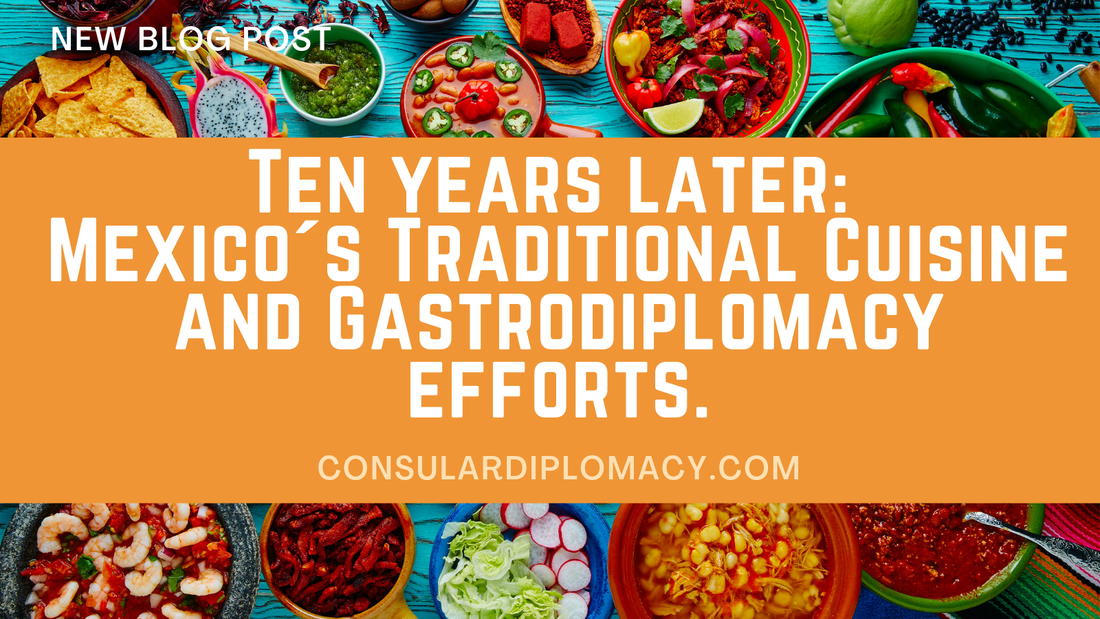 A few days ago, Mexico celebrated the tenth anniversary of its traditional cuisine as an Intangible Cultural Heritage by UNESCO. I believe it is an important milestone as it was the first cuisine included in the registry. The other two registries had a different perspective, the French meal emphasizes processes, while the Mediterranean diet focuses on ingredients, according to Gloria López Morales,[i] Founder and President of the Conservatorio de la Cultura Gastronómica Mexicana, a non-profit organization registered at the UNESCO. To learn more about Mexico´s Gastrodiplomacy efforts to achieve this goal, check out the post More than Tacos: Mexico´s scrumptious, yet unknown Gastrodiplomacy. So, what has happened in the last ten years? There are three significant developments since then: 1. Internally, the inclusion of our traditional cuisine in the UNESCO registry has given us an enhanced sense of pride. We always thought our food was great, but this was its international validation. Besides, it also created a revolution in our food scene; suddenly, some of our top chefs, such as Enrique Olvera and Jorge Vallejo, became international figures and were listed in the 50 Best Restaurant lists, climbing almost to the top.[ii] The recognition also makes them part of several documentaries such as Netflix´s Chef´s Table, or even their own shows such as Gabriela Camara`s Netflix show Una historia de dos cocinas, about Contramar restaurant in Mexico City and its sister in San Francisco. More importantly, our traditional cuisine had the attention of not only sociologists, food experts, and chefs but authorities and the general public. The rise of the Cocineras Tradicionales[iii] or Traditional female cooks and all the events that were built around their expertise is just remarkable. Part of the registration on the UNESCO´s list is to protect the heritage, so, in this case, the traditional cuisine was not just protected but was reappraised and revitalized. For example, there have been yearly national conferences for cocineras tradicionales, and also at the state level. They are also participating in international meetings and tours, such as one in Southern France in late 2019. It also helped in the regional cuisine phenomenon, which helps maintain the unique cuisines of regions and small towns across Mexico. Mexico's report about its efforts regarding this registry is due before the end of 2020, so it will be interesting to read it when it is published. 2. Externally, it helped in the promotion of Mexico as a tourist destination. In many promotional materials and ad campaigns, there were the reference of Mexican food as Intangible Cultural Heritage and the Cocineras Tradicionales. 3. Regarding UNESCO´s Intangible Cultural Heritage registry, it was the Campeche meeting in 2008 that generated enough momentum for the world to look at cuisine as a cultural heritage.[iv] Now, 26 countries have 18 “food preparation” elements in the registry.[v] Even after achieving the ultimate goal of the registry, Mexico has continued to embrace some Gastrodiplomacy strategies. The Institute of Mexicans Abroad continued to promote Mexican gastronomy after some of the programs came to an end in 2012, like supporting the Foro Mundial de la Gastronomia Mexicana. The forum has taken place six times since 2013. The one in 2018 took place in the United States under the titled “Viva la Comida Mexicana en Norteamérica,” and its objectives was to: “Strengthen the development of Mexican cuisine abroad through education, commercial expansion, and promotion of the entire value chain that constitutes the national and regional gastronomic heritage. To give continuity to the projects of support to the traditional cooks as carriers of the Gastronomic Patrimony of the country.”[vi] Additionally, in 2016 the Ministry of Foreign Affairs embarked on Gastrodiplomacy across the world with the designation of “Chefs Diplomatic corps” or Cuerpo Diplomático de Cocineros and the Young Talent internships in 12 embassies and consulates, as part of the “Ven a Comer” initiative launched the same year. So, let´s eat some traditional Mexican food as part of the celebration. Provecho!! [i] García Ocejo Mercedes, “Cómo la UNESCO designó a la gastronomía mexicana Patrimonio de la Humanidad” in El Heraldo de México, March 22, 2020. [ii] In the 2019 list, Olvera´s restaurant Pujol was number 12 and Cosme 23, while Jorge Vallejos´ Quintonil occupied the 24th position. [iii] The Cocineras tradicionales or traditional female cooks represent the traditional Mexican cuisine because most of them inherited the knowledge from their ancestors and carry on this heritage. For an interesting review of their role, see Matta, Raúl, “Mexico´s culinary heritage and cocineras traditionales (traditional female cooks)” in Food and Foodways, Vol. 27, Num. 3, 2019, p 211-231. [iv] Romagnoli, Marco “Gastronomic heritage elements at UNESCO: problems, reflections and intepretations of a new heritage category” in International Journal of Intangible Heritage, Vol 14, 2019, p. 165. [v] See UNESCO ´s ¨food preparation” category of the registry in the following link https://ich.unesco.org/en/lists?term[]=vocabulary_thesaurus-10 [vi] VI Foro Mundial de Gastronomía Mexicana website, “About Us, Objectives”, 2018. DISCLAIMER: All views expressed on this blog are that of the author and do not represent the opinions of any other authority, agency, organization, employer or company.
0 Comments
Your comment will be posted after it is approved.
Leave a Reply. |
Rodrigo Márquez LartigueDiplomat interested in the development of Consular and Public Diplomacies. Archives
May 2024
Categories
All
|
